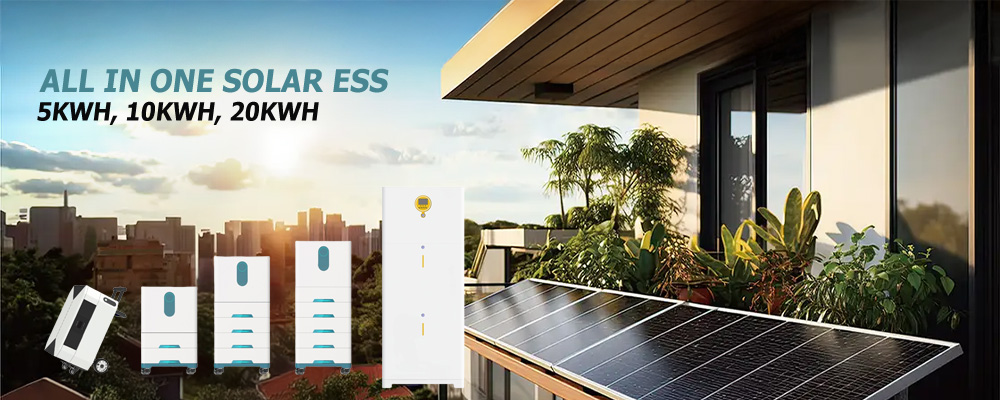
What Exactly is a Home Energy Storage System?
Simply put, a Home Energy Storage System acts like a rechargeable battery for your entire house. It captures electrical energy and stores it for later use. This technology commonly takes the form of a solar battery, which intelligently stores surplus electricity generated by your solar panels. This stored energy can then provide auxiliary power to your home when your panels aren't producing, such as at night or on cloudy days.
Beyond solar integration, a Home Energy Storage System can also be a standalone unit. These systems charge directly from the electrical grid. Homeowners often use them to provide crucial backup power during outages or to capitalize on cheaper off-peak electricity rates by storing power when it costs less and using it when grid prices are high.
Harnessing Solar Power: The Role of Solar Batteries
Solar panels are a fantastic way for homeowners to reduce their dependence on the electrical grid. By adding a solar battery – a key type of Home Energy Storage System – you can unlock the full potential of your solar investment. With a battery attached, you can bank the surplus energy your panels generate during sunny daylight hours. You can then tap into that stored electricity at night, on overcast days, or anytime your energy needs exceed your panels' immediate output. This significantly lowers your need to draw expensive power from the grid. If your battery becomes fully charged, any additional excess solar energy can often be sent back to the grid, potentially earning you credits.
While incorporating a battery system does add to the initial cost of a solar array, its presence brings the goal of complete energy independence – or going totally off-grid – much closer to reality. Without battery storage, solar panel owners might be limiting the return on their investment. Dave Roberts, Managing Director of UK-based energy storage specialist GivEnergy, underscores this. He points to a 2021 study in the journal Applied Energy comparing homeowners with solar panels alone versus those with a solar-plus-battery Home Energy Storage System. “The former only used around 30-40% of energy generated,” he states. “The latter reduced electricity imports from the grid by up to 84%.” This clearly demonstrates how a battery maximizes the value of your solar generation.
Standalone Home Energy Storage Systems: Grid-Powered Resilience and Savings
In contrast to solar-integrated setups, standalone Home Energy Storage Systems are not directly tied to a renewable energy source like solar panels for their charging. These installations, available in various sizes from portable wheeled units to full-sized systems hardwired into your home's electrical panel, draw their charge from the main utility grid.
Effectively, these standalone systems function like intelligent, rechargeable generators and serve two primary purposes:
Backup Power: During a power outage, they automatically kick in, ensuring your lights stay on and essential appliances keep running.
Cost Reduction: They enable energy arbitrage – storing grid electricity when it's cheapest (typically during off-peak hours) and then discharging that stored power to run your home when utility rates are at their peak.
Is a Home Energy Storage System a Smart Investment for You? Key Questions to Ask.
While the benefits of a Home Energy Storage System are compelling, whether it's the right investment depends on your individual situation. Emily Walker, Senior Researcher of Solar & Storage at EnergySage, suggests asking yourself four crucial questions to determine if a system is worthwhile:
Are Power Outages Common in Your Area?
If you frequently experience power outages, or if your area takes a long time to restore power, a Home Energy Storage System for backup could be a wise decision. dddhhhPower outages can wind up costing you a lot of money in damage,dddhhh Walker cautions, highlighting the protective value of stored energy.
Does Your Utility Offer Unfavorable Net Metering Terms?
True 1:1 net metering means your utility compensates you at the full retail rate for any excess solar electricity you send to the grid. If your utility offers less favorable terms, a battery for self-consumption becomes attractive. dddhhhThat way, you can avoid sending and pulling electricity from the grid, instead producing and consuming most—sometimes even all—of your electricity on-site,dddhhh explains Walker. This maximizes the value of your own solar generation by storing it in your Home Energy Storage System instead of selling it cheaply.
Are You Subject to Time-of-Use Rates or High Demand Charges?
If your electricity costs vary significantly by the time of day (with peak hours being much more expensive), a Home Energy Storage System can lead to substantial bill savings. dddhhhMany battery systems include software so you can strategically use your battery to avoid pulling electricity from the grid when it’s most expensive,dddhhh says Walker.
Are Local Incentive Programs Available to You?
Financial incentives like rebates or tax credits can significantly reduce the net cost of a Home Energy Storage System. dddhhhIncentives can significantly bring down the cost of batteries, but they won’t be around forever,dddhhh Walker advises. dddhhhNow could be the time to get a battery if you had good incentives available to you.dddhhh
If you answered dddhhhyesdddhhh to one or more of these questions, investing in a Home Energy Storage System might be a financially sound and practical decision for your household.
Do You Need a Battery if You Already Have Solar Panels?
This is a common question for existing solar panel owners. The decision to add a Home Energy Storage System (a battery) to your solar setup largely depends on your desire for energy resilience and the terms of your agreement with your local utility company. If maximizing self-consumption, having backup power during outages, or mitigating unfavorable net metering policies are priorities, then adding a battery to your solar panel system is a logical and often beneficial upgrade.
Conclusion: Empowering Your Home with Stored Energy
A Home Energy Storage System offers a versatile solution for homeowners seeking greater control over their energy, enhanced resilience against outages, and opportunities for cost savings. Whether paired with solar panels to maximize renewable energy use or used as a standalone system to manage grid electricity more effectively, this technology is transforming how we power our homes. By carefully considering your local utility rates, outage frequency, and available incentives, you can determine if investing in a Home Energy Storage System is the right step towards a more secure and economically efficient energy future for your household.


